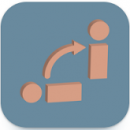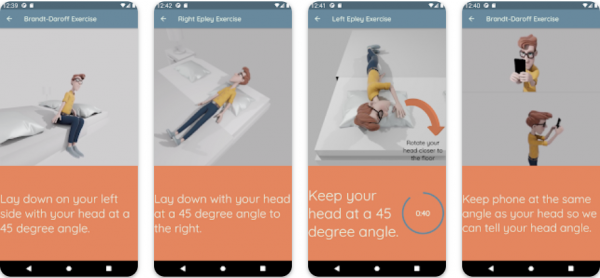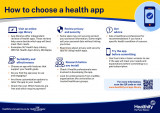| Vertex: Vertigo Exercises app | By Kebroad |
 |
Features |
| Country of origin | USA |
| Clinical review |
|
| Security and privacy | Does the app:
Read more about safety and security when using apps. Brochures: |
| Cost | Free |
| Advertisements | This app contains ads, which may vary from user to user. |
| How to get the app |
We're aware of a problem when trying to use Zero Data to link to Healthify. Zero Data is managed by Health NZ and we are working with them to get this fixed.
Vertex: Vertigo Exercises app
Vertex: Vertigo Exercises app
- The guided exercises appear to be aimed at users who have benign paroxysmal positional vertigo (BPPV) affecting the posterior semicircular canal, although the app does not actually state this.

The app claims its intended purpose is to demonstrate vertigo treatment exercises, using the phone’s inbuilt accelerometer to help instruct the user through head exercises.
For the complete app description, go to the Google Play(external link) or, for a more detailed review, see reviews below.

| PROS | CONS |
|---|---|
|
✔ The app clearly states that it's not intended to replace professional medical advice, diagnosis or treatment each time you open the app. ✔ Demonstrates the Epley manoeuvre however the instructions are not 100% accurate and vary slightly from other medical guidelines for the manoeuvres. ✔ Includes animations on how to perform the head movements/positions, which may be helpful in terms of the specifics of the manoeuvre. ✔ Has a timer to guide user on how long to stay in a position. ✔ If used correctly, the phone’s inbuilt accelerometer can potentially help instruct the user through head exercises at the correct angle. In theory this should help to optimise the efficacy of the procedure (depending on reliable positioning of the phone in comparison to the head). |
✘ Only available on Android and Windows (however the app uses the phone’s inbuilt accelerometer which cannot be used with a computer). ✘ Windows download is an APK (Android Package Kit) file which the reviewer couldn't open on a PC. ✘ The app has not received any user ratings or reviews to date. ✘ It's not clear if the app has been developed by a medical or health professional. ✘ The app offers a “right/left ear test” which appears to have the intended purpose of diagnosing the affected side and determines which test should follow (eg, “You have vertigo in your right ear”, determines the “Right Epley Exercise” manoeuvre). However, diagnosis by a medical professional or specialist in vestibular disorders is essential for vertigo, dizziness and other balance disorders for proper and full assessment and diagnosis. ✘ Arrows on the app guide head movements, however, this depends on the user having the phone at the correct angle/position in relation to their head. ✘ The app doesn't state what the manoeuvres are intended for (eg, the Epley manoeuvre can be used for treating benign paroxysmal positional vertigo (BPPV), but is ineffective for other causes/types of vertigo, however the app does not state this). ✘ The app demonstrates the Brandt-Daroff exercises which are not an effective treatment for BPPV or supported by the International Clinical Practice Guideline for BPPV, as these exercises are for habituation (desensitisation of the central nervous system), as opposed to particle repositioning (of the loose crystals). ✘ The app demonstrates the Epley manoeuvre which is not shown with 100% accuracy and therefore may not be effective. ✘ The app indicates that the pillow is used to support the head, however it is important that it supports the back and shoulders (not the head) and it is also important that the head is brought down past the pillow. ✘ No safety warnings on the app to advise users of the risks of performing these manoeuvres on their own. ✘ The app does not provide any information on BPPV or other vertigo disorders. ✘ There is no advice to seek further medical attention if the manoeuvres fail to fix the problem or if there are other ear or neurological symptoms. |
Clinical review
![]()
Reviewer: Dr Rachael Taylor, PhD, MAud, PGDipSci, BSc, MNZAS. Research Fellow and Vestibular Audiologist, the University of Auckland, Department of Physiology.
Vanessa Simpson BHSc (Physiotherapy), NZRP. Senior Vestibular and Neurological Physiotherapist and Educator. Owner of Vertigo Balance Clinic.
Tania Linford MNZAS, BSc, Maud, PGDip Couns. Senior Clinical Audiologist. Owner and operator of Tinnitus Relief Limited.
Date of review: June 2023
Platform: Android
Version: 2.0.0
Comments: Insufficient information has been given in the app about its intended purpose for exercises that may help with BPPV rather than other vertigo disorders. The app may be useful for users who have received a diagnosis from a healthcare professional or specialist, who have approved the app as suitable for that individual, however, it should be used with caution as the Brandt Daroff exercise is not a recommended treatment.
The app is limited to exercises that may help with BPPV but the app does not state this.
The app includes the Brandt Daroff exercises which are not a recommended treatment for BPPV.
The Epley manoeuvre is not demonstrated with 100% accuracy.
This app would only be recommended for someone who has already sought medical attention and has received an appropriate diagnosis and explanation of posterior canal BPPV. It might be useful as an adjunct (recommended by a clinician) for home treatment for those cases where the person is prone to recurrence (and the clinician has ruled out other mimics).
There is no advice to seek further medical attention if the manoeuvres fail to fix the problem or if there are other ear or neurological symptoms. Users should seek medical attention for a diagnosis.
Please note: It is essential that vertigo, dizziness and other balance disorders are properly and fully assessed and diagnosed by a medical professional or specialist, and their advice is followed, prior to users attempting to use vertigo apps.
Safety concerns: Yes. The manoeuvres presented in the app may induce (or make worse) vertigo and dizziness during the movement; (ie particularly for some types of vertigo such as vestibular migraine); however there do not appear to be any warnings on the app that this may occur, or recommendations to perform them under supervision.
The guided manoeuvres are only suitable for benign paroxysmal positional vertigo (BPPV) involving the posterior semicircular canal, and not other types or causes of vertigo, however this does seem to be clearly stated on the app.
The Brandt-Daroff exercise is not a recommend treatment for BPPV as it is not effective or supported by the International Best Practice Guidelines.
The app does not appear to contain advice to seek further medical attention if the manoeuvres fail to fix the problem or if there are other ear or neurological symptoms.
New Zealand relevance: Yes; but only available in English.
|
Disclaimer: The NZ Health App Library is a free consumer service to help you decide whether a health app would be suitable for you. Our review process is independent. We have no relationship with the app developers or companies and no responsibility for the service they provide. This means that if you have an issue with one of the apps we have reviewed, you will need to contact the app developer or company directly. |
Factsheets – using health apps safely

How to choose a health app
Healthify He Puna Waiora, NZ

Privacy and security tips for using health apps
Healthify He Puna Waiora, NZ
Credits: Healthify editorial team. Healthify is brought to you by Health Navigator Charitable Trust.



